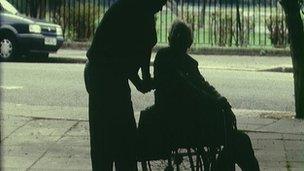Poor health contributes to loneliness in older people
- Published

Older people with disabilities that affect daily living are most likely to feel isolated, the report says
Older people in poor health in England are almost three times more likely to feel lonely than those in excellent health, a study suggests.
Some 59% of people over 52 and in poor health said they felt lonely sometimes or often, compared with only 21% of those in excellent health.
Loneliness is highest among the over-80s, data analysed by the Office for National Statistics (ONS) suggests.
The charity Age UK said local authority cuts were exacerbating the problem.
The figures are based on analysis of the most recent data from the English Longitudinal Study of Ageing. The study has interviewed more than 8,000 older people at two-yearly intervals since 2002.
The study reports a "strong association" between feelings of loneliness and poor health and disability in older people.
Some 45% of those with a long-standing illness that limited their activities told the researchers that they felt lonely sometimes or often, says the report, compared with some 27% without such a condition.
Feelings of loneliness rise among the over-80s, with 46% saying they feel lonely sometimes or often, compared with 34% of over-52s overall.
Some two-thirds (66%) of those aged 52 or over reported hardly ever or never feeling lonely.
Being widowed also contributes to feelings of loneliness, according to the figures.
Shrinking social networks
More than three-quarters (77%) of those who were married, remarried or in a legal partnership said they were hardly ever or never lonely.
This figure drops to 38% among widows: some 63% of the widows interviewed said they felt lonely sometimes or often.
Michelle Mitchell, of Age UK, said: "All the evidence shows that it is the over-80s who are the most likely to be lonely. As we get older, we are more likely to suffer illness and disability which can prevent us from getting out and about, and people's social networks often shrink due to life-changing events such as retirement and bereavement, which can increase the risk of becoming lonely.
"At Age UK we are extremely concerned that cuts to local authority budgets are exacerbating the problem of loneliness and isolation for many older people.
"The ongoing crisis in the provision of social care means that large numbers of older people are missing out on essential care that could make the difference between staying active and becoming isolated.
'Huge gap in funding'
"The government must also take action to address the huge gap in social care funding to help millions of older people up and down the country who are in urgent need of support."
Councillor David Rogers, of the Local Government Association, said: "We can't escape the very real crisis this country is facing in providing care for the elderly and vulnerable.
"Local authorities want to offer a service which goes beyond a basic level of care but this is becoming increasingly difficult as our population ages, costs climb and the already significant funding shortfall becomes even more severe.
"The stark reality is that unless we see an urgent injection of money from central government to meet rising demand in the short term, alongside a major revision of the way social care is paid for and delivered in future, things will continue to get worse.
"Providing people with dignity in old age must be a priority for all levels of government. This needs to be addressed as a matter of urgency."
A spokeswoman for the Department of Health said: "For the first time, this year we are helping local authorities to measure how lonely or isolated people in their area feel. This information will help them identify how serious the problem is in their communities and what action is needed to tackle it.
"By working together to reduce loneliness and social isolation, older people will have a chance to lead significantly healthier and happier lives."
- Published8 April 2013
- Published26 March 2013
- Published23 February 2013
- Published10 November 2010